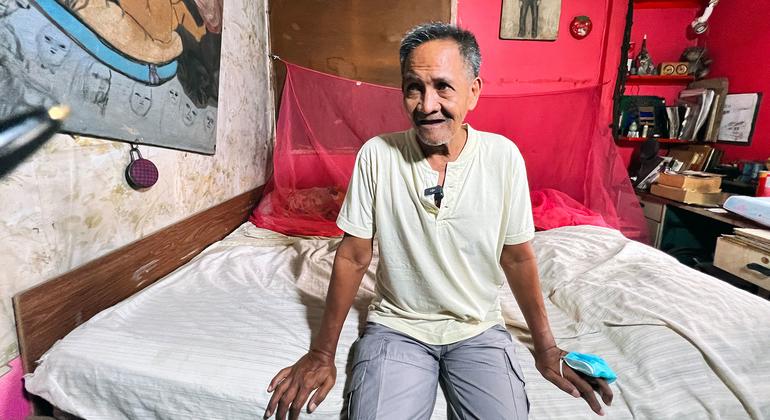The Philippines has one of the most overcrowded penal systems in the world, with the number of inmates exceeding four times the planned capacity. This puts the country in the same league as nations like the Democratic Republic of the Congo, Haiti, and Uganda. However, the Government, in collaboration with the UN Office on Drugs and Crime (UNODC), is taking steps to address this issue by focusing on the release of elderly prisoners.
One such individual who has benefited from this initiative is Toto Aquino, a 70-year-old man who was recently released from prison after spending eight years behind bars. In an interview with UN News, Toto shared his experiences of incarceration and his life after being released. He described how he spent four years in pre-trial detention at Manila City Jail and another four years at Bilibid prison, which was extremely overcrowded.
During his time at Bilibid, Toto slept on a piece of cardboard in a corridor due to the lack of space. He was housed in a maximum-security wing alongside gang members, even though he was not a part of any gang himself. The conditions were tough, with strict schedules for sleeping and waking up, and limited options for food. Toto survived on the basic prison food provided, known as “rancho,” which consisted of porridge, coffee, bread, rice, and occasionally hotdogs.
Despite the hardships he faced in prison, Toto expressed relief and gratitude for being released. He now lives with his younger brother in their childhood home, enjoying the simple pleasures of eating and sleeping comfortably. Toto mentioned how he dreamt of chicken adobo and a soft mattress while in prison, and now he is able to enjoy both of these things in his newfound freedom.
Since his release, Toto has been adjusting to life outside of prison, taking on household chores and staying active by doing press-ups to maintain his fitness. He longs to reunite with his daughter, whom he has not seen in a decade, and hopes to meet his grandchild soon. Reflecting on his experience, Toto emphasized the importance of prioritizing the release of elderly prisoners like himself, as he knows others who are much older and still incarcerated.
The overcrowding in Philippine prisons has been a longstanding issue, leading to inhumane conditions and challenges in the rehabilitation and reintegration of inmates back into society. The release of elderly prisoners is seen as a step towards addressing these challenges and reducing the strain on the country’s penal system.
The collaboration between the Government and the UNODC in this effort highlights the importance of international partnerships in addressing complex issues like prison overcrowding. By prioritizing the release of elderly prisoners, the authorities are not only easing congestion in prisons but also giving individuals like Toto a second chance at life outside of confinement.
As Toto enjoys his newfound freedom and reconnects with his family and community, his story serves as a reminder of the resilience and hope that can emerge even in the most challenging circumstances. His journey from prison to a peaceful life at home is a testament to the power of compassion and support in the process of rehabilitation and reintegration.









